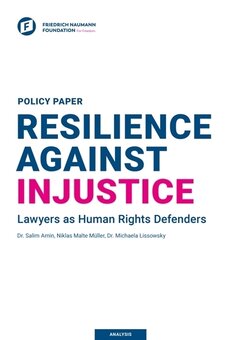European Convention
A Milestone in the Protection of the Legal Profession

On March 12, 2025, the European Convention on the Protection of the Legal Profession was unanimously adopted by the Committee of Ministers of the Council of Europe. This international instrument aims to safeguard the legal profession's core values and ensure access to justice under international law. The Convention will be open for signature on May 13 during the meeting of the Council of Europe’s Foreign Ministers in Luxembourg.
The legal profession forms the foundation of the rule of law by ensuring access to justice, protecting human rights, and holding public authorities accountable. However, lawyers in some European countries — particularly in illiberal and authoritarian regimes — have faced increasing threats, including intimidation, arbitrary imprisonment, and even assassination. These developments underscored the necessity of establishing a binding international legal framework to protect the legal profession.
Against this backdrop, the Council of Europe initiated the drafting of a European Convention on the Profession of Lawyer in 2022. The objective was to strengthen the rights and independence of lawyers in member states and to provide effective protection, particularly in countries with a restricted rule of law.
Key Provisions and Implications
The Convention establishes comprehensive protections for the legal profession, including guarantees of independence, safeguards against undue interference, and protections against arbitrary disciplinary proceedings. A key feature is the explicit obligation of signatory states to ensure that lawyers can carry out their professional duties freely and without intimidation (Article 10). This provision is particularly significant in jurisdictions where the judiciary is compromised or politically controlled.
Another crucial aspect is the regulation of confidentiality and professional secrecy, which strengthens lawyers’ rights to communicate with their clients without state surveillance (Article 7). This provision challenges draconian measures in authoritarian states that exploit national security laws to monitor or prosecute legal professionals. Additionally, the Convention reinforces the role of bar associations by emphasizing their independence from state interference. In countries like Turkey and Russia, state-controlled bar associations have been used to discipline human rights lawyers and regime critics. The Convention seeks to prevent such practices by mandating that professional legal bodies operate autonomously.
Implementation Challenges and Remaining Gaps
Although the Convention acknowledges that lawyers, especially in conflict zones and authoritarian states, face significant risks (Articles 3 & 7), it lacks specific provisions to ensure rapid response mechanisms for endangered lawyers. The enforcement of bar association independence remains a major challenge in states where governments exert strong influence over legal institutions.
The strengthening of lawyer-client confidentiality depends on national implementation. While the Convention addresses protection against attacks by non-state actors, it does not impose binding obligations on states to take proactive protective measures.
The absence of a judicial enforcement mechanism weakens the Convention’s potential effectiveness. Its monitoring system, modeled after the evaluation process of GRECO (Group of States against Corruption), may exert political pressure, but without concrete enforcement measures, its impact could be limited. Access to clients and legal proceedings, particularly in politically sensitive cases such as those involving migration and asylum, is acknowledged but not comprehensively protected. Similarly, the Convention lacks robust safeguards for lawyers living in exile.
On a positive note, the Convention is open to non-member states of the Council of Europe, giving it the potential to establish a global standard for the legal profession’s protection. However, the absence of clear enforcement mechanisms raises questions about its global impact.
Outlook on Legal Protection in Europe
The success of the Convention will depend on political commitment and active engagement from civil society in the coming years. Legal advocacy organizations must push for swift ratification and implementation, leveraging regional human rights mechanisms to hold violators accountable.
The European Union can play a complementary role by linking financial aid and trade agreements to adherence to legal protections for lawyers. The European Parliament has already expressed interest in integrating the Convention’s principles into its rule-of-law mechanisms.
At the same time, the international legal community must remain vigilant against efforts to dilute the Convention’s provisions. The coming years will be decisive in determining whether this historic agreement truly serves as a shield for lawyers against repression or remains a symbolic yet ultimately ineffective legal instrument.


